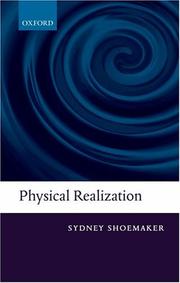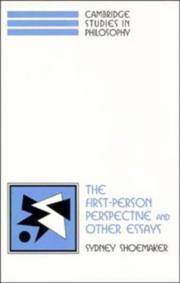| Listing 1 - 4 of 4 |
Sort by
|
Book
ISBN: 0521318246 0521259193 9780521318242 Year: 1984 Publisher: Cambridge Cambridge University press
Abstract | Keywords | Export | Availability | Bookmark
 Loading...
Loading...Choose an application
- Reference Manager
- EndNote
- RefWorks (Direct export to RefWorks)
Philosophical anthropology --- Philosophy --- Psychology --- Philosophie --- Psychologie --- Behavioral sciences --- Mental philosophy --- Mind --- Science, Mental --- Human biology --- Soul --- Mental health --- Humanities

ISBN: 9780199214396 0199214395 Year: 2007 Publisher: Oxford Clarendon
Abstract | Keywords | Export | Availability | Bookmark
 Loading...
Loading...Choose an application
- Reference Manager
- EndNote
- RefWorks (Direct export to RefWorks)
Theory of knowledge --- Realism. --- Logical positivism. --- Causation. --- Philosophy of mind. --- Materialism. --- Causation --- Logical positivism --- Materialism --- Philosophy of mind --- Realism --- Empiricism --- Philosophy --- Universals (Philosophy) --- Conceptualism --- Dualism --- Idealism --- Nominalism --- Positivism --- Rationalism --- Mind, Philosophy of --- Mind, Theory of --- Theory of mind --- Cognitive science --- Metaphysics --- Philosophical anthropology --- Physicalism --- Animism --- Mechanism (Philosophy) --- Monism --- Logical empiricism --- Neo-empiricism --- Neo-positivism --- Positivism, Logical --- Unity of science movement --- Language and logic --- Logic --- Meaning (Psychology) --- Reductionism --- Relationism --- Science --- Analysis (Philosophy) --- Verification (Empiricism) --- Vienna circle --- Causality --- Cause and effect --- Effect and cause --- Final cause --- Beginning --- God --- Necessity (Philosophy) --- Teleology

ISBN: 0521568714 0521560306 9780521568715 9780521560306 9780511624674 0511624670 Year: 1996 Publisher: Cambridge Cambridge University press
Abstract | Keywords | Export | Availability | Bookmark
 Loading...
Loading...Choose an application
- Reference Manager
- EndNote
- RefWorks (Direct export to RefWorks)
Sydney Shoemaker is one of the most influential philosophers currently writing on philosophy of mind and metaphysics. The essays in this collection deal with the way in which we know our own minds, and with the nature of those mental states of which we have our most direct conscious awareness. Professor Shoemaker opposes the 'inner sense' conception of introspective self-knowledge. He defends the view that perceptual and sensory states have non-representational features - 'qualia' - that determine what it is like to have them. Amongst the other topics covered are the unity of consciousness, and the idea that the 'first-person perspective' gives a privileged route to philosophical understanding of the nature of mind. This major collection is sure to prove invaluable to all advanced students of the philosophy of mind and cognitive science.
Philosophy of mind. --- Self (Philosophy) --- Consciousness. --- Perspective (Philosophy) --- Consciousness --- Philosophy of mind --- Philosophy --- Mind, Philosophy of --- Mind, Theory of --- Theory of mind --- Cognitive science --- Metaphysics --- Philosophical anthropology --- Ontology --- Apperception --- Mind and body --- Perception --- Psychology --- Spirit --- Self --- Perspective (Philosophy). --- Self (Philosophy). --- Conscience --- Arts and Humanities --- Moi (philosophie) --- Philosophie de l'esprit
Book

ISBN: 9782940431618 2940431612 Year: 2018 Publisher: Genève : La Baconnière,
Abstract | Keywords | Export | Availability | Bookmark
 Loading...
Loading...Choose an application
- Reference Manager
- EndNote
- RefWorks (Direct export to RefWorks)
Comment les objets matériels persistent-ils à travers le temps ? Qu'est-ce que cela veut dire qu'un objet change tout en étant un et le même ? Peut-il y avoir un monde sans temps ? Le temps s'écoule-t-il même si rien ne change ? Et, le temps lui-même, qu'est-ce que c'est ? Consiste-t-il seulement en l'instant présent, ou le passé et le futur existent-ils également ? Est-il possible de voyager dans le temps ? Quelles propriétés le temps doit-il avoir pour permettre le voyage dans le temps ? Est-il possible de changer le passé ? Ce volume réunit des traductions inédites de textes issus de la philosophie du temps des XXe et XXIe siècles. Ces contributions de Robert M. Adams, Jiri Benovsky, David Braddon-Mitchell, Michael Dummett, Graeme Forbes, Mark Heller, Paul Norwich, Robin Le Poidevin, David Lewis, David H. Mellor, Sydney Shoemaker, Theodore Sider, John J. C. Smart, Willard V. O. Quine, et Peter Van Inwagen offrent des manières différentes de réagir à ces interrogations. Ces textes témoignent de la richesse des débats contemporains en matière de philosophie du temps et présentent une variété de notions, d'arguments et de théories, telles que l'endurantisme, le perdurantisme, le relationnisme et le substantialisme, mais également d'importantes considérations en ce qui concerne la causalité, l'identité, le changement, ou encore l'analyse des similarités entre le temps et l'espace. Une large section se penche, enfin, sur la question du voyage dans le temps car il a ceci de particulièrement intéressant : il sert de cas limite en offrant la possibilité de tester les théories et de soulever de nombreuses questions philosophiques sur la nature du temps et du monde.
Time --- Philosophy, Modern --- Philosophy --- Time - Philosophy --- Time perception --- Time study
| Listing 1 - 4 of 4 |
Sort by
|

 Search
Search Feedback
Feedback About UniCat
About UniCat  Help
Help News
News